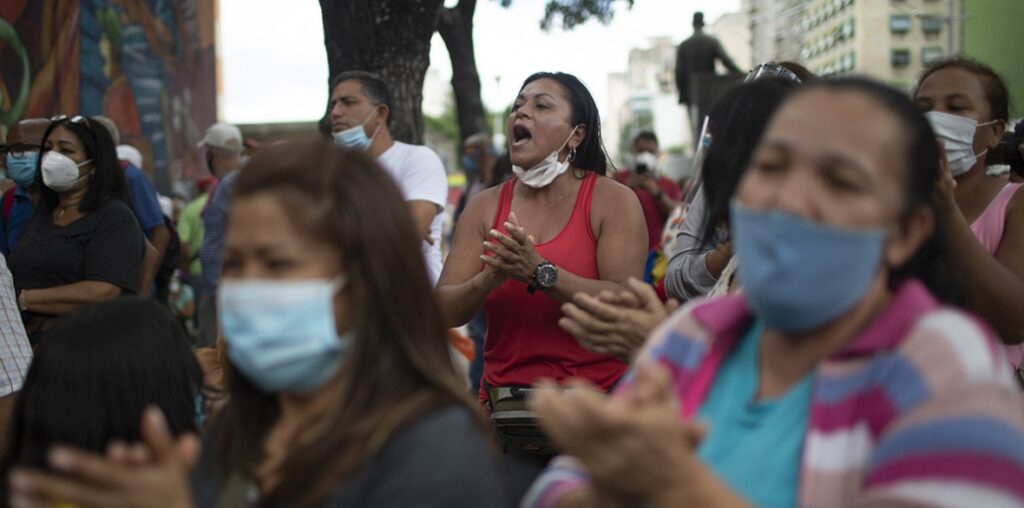The world’s coup-plotters and warmongers haven’t given up on getting their hands on Venezuela’s oil, writes KEN LIVINGSTONE
THE International Monetary Fund (IMF) is poised to deny Venezuela over $5 billion of Special Drawing Rights (SDRs) to bolster its reserves on the grounds that the elected President Nicolas Maduro is not the undisputed legitimate leader of the country.
The overall SDR fund, worth $650 billion (£459bn), is to be allocated to help emerging and low-income nations deal with mounting debt and the Covid-19 pandemic.
The IMF’s reactionary refusal to allow Venezuela access to the $5bn (£3.5bn) pot maintains that “the ongoing political crisis in Venezuela has led to a lack of clarity in the international community … regarding official government recognition.”
Therefore Venezuela will not be able to use its new SDRs “until a government is recognised,” according to an IMF representative.
This is the second time in less than 15 months that the IMF is withholding cash from Venezuela’s government.
In March 2020 the IMF refused President Nicolas Maduro’s request for $5bn to fight the coronavirus pandemic.
In rejecting the application, the IMF argued that there was “no clarity” among its 189 member states on who it recognises as Venezuela’s legitimate head: the democratically elected President Maduro or the self-proclaimed “interim president” Juan Guaido, backed by the US.
In practice, the countries recognising Guaido as leader number less than a third of the IMF’s membership.
But the IMF is faithfully reflecting the position of the US, the largest cumulative contributor to the Fund and holder of effective veto power for many decisions.
The US’s support for Guaido has been a key part of its narrative about Venezuela since 2019, providing further justification in its view for blocking Venezuela’s access to the international financial system through a web of sanctions.
During the Trump presidency, the US’s illegal sanctions were ratcheted up to amount to a full-on Cuba-style blockade of Venezuela’s trade and financial dealings.
To date, US sanctions have cost Venezuela’s economy upwards of $116bn (£84.8bn), with the poorest and most vulnerable citizens hurt the most.
The effect has been to severely restrict Venezuela’s access to food and other essential goods but also medicines, while robbing Venezuela of the income to pay for them.
The US government has also frozen a range of US-based Venezuelan assets, including $342 million (£241m) held by the Venezuelan Central Bank, while handing over control of some of these resources to Guaido where it can and pushing for their lockdown where it cannot.
A prime example of this is the current struggle between the Venezuelan government and the Bank of England over access to 31 tonnes of Venezuelan gold worth more than $1bn (over £800m) that it had deposited with the bank.
Faced with the bank’s refusal to return the gold, Venezuela tried to reclaim control through the British courts.
At first it lost its case in the commercial court, which endorsed the British government’s recognition of Guaido as Venezuela’s leader rather than elected president Nicholas Maduro.
But the Appeal Court overturned this verdict. This reopened the argument that whatever Guaido claims about being “interim president,” the British government is currently recognising President Maduro as exercising some or all of the powers of the Venezuela presidency.
It therefore has legitimate claim to the gold. The Supreme Court will now decide on the case.
Since the Appeal Court ruling in October 2020, though, elections to Venezuela’s national assembly have taken place.
Although some opposition parties stood candidates, Guaido boycotted the elections, thereby losing his seat and any semblance of claim to be “interim president,” based as it was on his presidency of the previous national assembly.
After these elections it is significant that the EU referred to Guaido as a representative of the outgoing national assembly, effectively no longer recognising him as “interim president.”
But the new Biden administration is sticking with the Trump policy of supporting Guaido and using sanctions to achieve “regime change.”
The British government, which has formally backed Guaido since February 2019, is still slavishly following the US’s line.
But in Venezuela things are on the move which are further undermining Guaido’s already tenuous position.
The national assembly has recently appointed a new national electoral council with two principal members (out of five) belonging to the opposition, from currents that previously supported the electoral abstention position espoused by Guaido and the radical right.
The opposition pedigree of these two members means that they cannot be effectively accused of being bought by the government — and suggests that strong opposition parties will participate in forthcoming elections.
Their abandonment of the abstention/insurrectionary path of Guaido can only weaken him.
It makes even plainer that he depends on US support for any standing and weakens a key plank of the US’s “regime change” agenda.
What is needed is for the British government to abandon its adherence to this US agenda and embark on a policy of dialogue and constructive engagement with Venezuela.
Join a wide spectrum of countries, organisations and prominent figures in calling for US sanctions to end illegal sanctions bit.ly/stopvenezuelasanctions.
Follow Ken at www.twitter.com/Ken4London and www.facebook.com/KenLivingstoneOfficial.
This article originally appeared in The Morning Star

